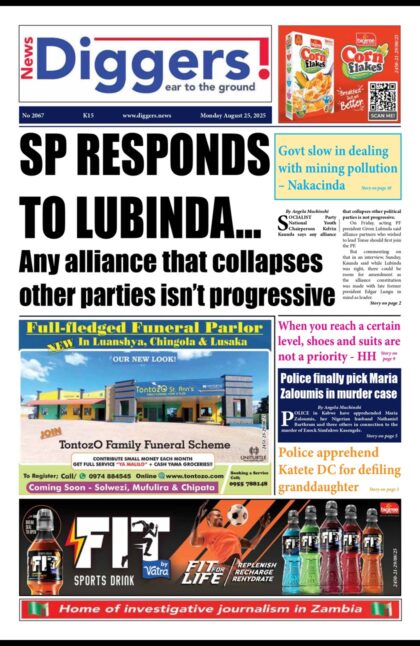President Hichilema’s Government was sworn in with a mandate to transform the Zambian economy. On that fateful afternoon in August 2021, he assumed the responsibility to usher this country into a new era of economic prosperity, the path to which has not been as plain sailing as he, and indeed, the people would have hoped. In the last 3 years, several challenges have threatened our growth aspiration, such as the prolonged and uncertain path to debt restructuring, the war in Eastern Europe and its effect on energy markets and now the drought. Listening to the country’s leadership, particularly the President and the Minister of Finance, one is assured, nevertheless, that the medium-long term prospects of the economy remain favourable.
As a member of the Economics Association of Zambia (EAZ), I was able to listen to Dr. Musokotwane during his keynote speech at the just ended EAZ National Economic Summit, in which he described the many challenges, which I have already alluded to, as momentary, transitory even. He assured economists and others alike that the fundamentals of the economy remain resolute and paraphrasing his words, in a few years’ time the economy will be the strongest it has ever been in history. This was a big claim by the Minister, bearing in mind that we have experienced rapid economic progress over the course of our history.
When was this? Around the years of the financial crisis, the Zambian economy was one of the fastest growing in the world, reaching a growth rate of 10%. Soon after independence, a copper boom triggered a phase of equally rapid growth, which made Zambia one of the wealthiest African countries, at the time. However, the fact that the Minister would declare that what is ahead of us is even better than these two periods, I repeat, is a big claim. Nonetheless, there are few people as knowledgeable of the Zambian economy as the current Minister of Finance. Indeed, he was the Minister during the period of rapid growth I mentioned under the MMD Government. So he knows what he is talking about.
What is the reason for this optimism, you may wonder? I will go back to the word I used earlier, fundamentals. When I say fundamentals, I mean the foundational determinants of whether an economy will thrive or not. What are these? One of these and most crucial in our context was the debt restructuring. Beginning 2021, the Zambian Government diligently pursued the renegotiation of our debt, which had increased to unsustainable levels. In 2022, we commenced our IMF program. Tough decisions had to be made such as the phasing out of energy subsidies. Challenges were encountered, such as delays and disagreements between our creditors about how to treat our debt. Seemingly, our situation pitted the US and China against each other, as one Government criticized the other. Nonetheless, debt agreements were reached and billions of dollars will be saved in reduced repayments.
What is the second fundamental? The Mining Sector. In 2022, I wrote an article on changes that had been made to the mining tax regime. In that year, mineral royalty was made deductible for Corporate Income Tax purposes. This amongst other changes, signaled to the Mining sector that the new regime would employ a more accommodative approach to the Mining sector in the process unlocking a number of investments which have topped $10 billion dollars. There are a flurry of new mines opening and existing ones are undertaking major investments. FQM is expanding. Barrick Lumwana is expanding. China Non Ferrous Metal Company is doing the same. Kobold metals has entered the market with the Mingomba Mine which has the biggest copper deposit ever unearthed in Zambia. Shaft 28 is being dewatered. More recently, the KCM board was reinstated after payment of $245 million to small claims creditors. Before that International Resource Holdings took over Mopani Copper Mines.
Other important issues to mention which though not of the same magnitude as the above but still instrumental are CDF, Human Capital and Infrastructure Investments.
Development is not complicated. Development has occurred in nearly every part of the world, except much of Sub-Saharan Africa. What triggers it? The fundamentals which I have just mentioned. How is this so? To transform an economy, you have to approach the problem from an individual country context. Policy makers must identify what is dragging on growth. Thereafter, in order to restore growth, they must determine what are the key productive sectors of the economy and provide stimulus. Added to this must be investments in the citizens through education and health, as well as investments that support the industrial ecosystem. The specifics can look different in different countries. However, in these varying scenarios we can extract a common strand, founded on economic fundamentals, which I have attempted to labored on.
As I conclude, the Minister of Finance’s bullishness about the economy he is directing may be understandable. Despite the present challenges of the drought, the medium-long term prospects of the economy remain bright. I am assured the economy will develop and the lives of the Zambian people will improve. It is just a matter of time. It’s like watering a plant or tree. In the same way you will not see the benefits as you water, we might not see the fruits of a lot of what is happening. It will only become clear in a few years’ time. But it will happen.
The Author is an Economist
























